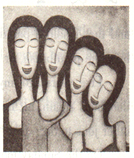
【题目】珠江三角洲地区工业发展的突出优势是()
A. 原有工业基础好
B. 能源资源丰富
C. 高等教育发达
D. 紧邻香港、东南亚,便于引进外资和技术
 阅读快车系列答案
阅读快车系列答案科目:初中地理 来源: 题型:
【题目】读我国南部沿海局部地区图,完成下列问题。

(1)珠江口两侧分布着我国两个特别行政区(甲、乙)。其中,甲为___________特别行政区。
(2)改革开放初期,珠江三角洲(图中阴影部分)与甲、乙两特别行政区形成前后厂“的经济合作模式。其中,“后厂”指___________地区,“厂”即生产加工企业,在本地区建厂的优势有___________。
(3)读图,说出海南岛的地势特征。
(4)海南岛有着得天独厚的自然条件,是我国北方许多城市冬季的“菜篮子”。结合图中信息,简要说明原因。
查看答案和解析>>
科目:初中地理 来源: 题型:
【题目】Though he _______ the book three times, he hopes to read it again.
A.read
B.reads
C.has read
D.would read
查看答案和解析>>
科目:初中地理 来源: 题型:
【题目】上海市气象部门通过多年的观测发现,中心城区的气温比郊区平均要高0.5℃左右,主要原因是( )
A. 人类活动 B. 纬度位置 C. 海陆分布 D. 地形地势
查看答案和解析>>
科目:初中地理 来源: 题型:
【题目】在下列图画下写出与句子内容相对应的名字
(1)
A. My name is Ann. Today I'm in a sweater and trousers. No shoes today!
B. My name is Tom. I'm in a white shirt and white trousers. My shoes are white, too.
C. My name's Kate. Today I'm in a white T-shirt and black skirt. My shoes are black.
D. My name is Jim. I'm in a coat and black trousers today. My shoes are black, too.
查看答案和解析>>
科目:初中地理 来源: 题型:
【题目】
Hello from home! How long has been it________ we last met? Yeah, two months!
My family and I have just been _____ from a two-week trip to Europe for our recent vacation. We visited Paris, France, and London, England. Here I want to share my tour of Paris with you.
When we_____ , we all expected a funny and interesting vacation. For my sister and me, our stay in Paris had ______meaning. It was a good chance to practice our French, since English and French are the two official (官方的) languages in Canada. My mum doesn't speak French, and my sister can't speak it______ (she is only in Grade 3). So it was my______ to ask for directions (方向), order food, and deal with any person-to-person communication. I was, of course, really nervous.______ they couldn't understand my French______ I couldn't understand theirs?
My______ soon went away. The people in Paris ______ very. happy to answer my questions. They listened patiently and carefully, and spoke slowly to make themselves______ . One gentleman was even kind enough to lead us to the hotel we were ____
_______ the places we visited? We visited many places in Paris. My sister liked the Eiffel Tower and the Arch Triumphal (凯旋门). My mum liked the Louvre Museum (卢浮宫) most. Which places did I like? I liked all of them.
Paris is a city that we will always keep in______ . I suggest you visit there, too. I am sure it will be an amazing ______. You will be amazed at everything there!
【1】A. after B. before C. till D. since
【2】A. back B. away C. around D. off
【3】A. set up B. set in C. set on D. set out
【4】A. another B. other C. the others D. others
【5】A. too good B. too well C. well enough D. good enough
【6】A. pleasure B. duty C. course D. hobby
【7】A. What if B. Unless C. Because D. Instead
【8】A. and B. but C. although D. or
【9】A. sadness B. happiness C. patience D. worries
【10】A. seemed B. became C. turned D. kept
【11】A. understanding B. understood C. understand D. to understand
【12】A. looking after B. looking for C. looking up D. looking down
【13】A. Shall we B. What about C. Let's D. Why not
【14】A. head B. thought C. mind D. plan
【15】A. event B. experience C. story D. discovery
查看答案和解析>>
科目:初中地理 来源: 题型:
【题目】(题文)
We all know the strange feeling of watching the time change on a o’clock.
You never really see it change because the hands move so slowly. But, of course, the time is changing all the time.
Human faces, like clock faces, are also changing. And like clocks, the changes take place too slowly to be noticed. Over many thousands of years, though, huge changes are possible. For example, the human brain tripled (三倍的) in size. Our faces became flatter, and we began to think more.
If our heads became larger in the past, how will things change in the future? Unlike the changes of a clock face, the changes in human faces are not easy to predict (预测). It is mainly because of the way in which we can now control parts of nature. Hundreds of thousands of years ago, all changes were natural, but now we can actively choose paths for our own evolution(进化).
A US artist named Nickolay Lamm has recently offered an idea at what human faces may one day look like. The designs, inspired (受启发) by his conversations with scientist Alan Kwan, show humans with larger heads and eyes. In particular, Lamm predicts the forehead may be larger because of increasing usage of the brain.
Just a few hundred years ago, most humans were working in the fields, while nowadays more and more people get education. These are just predictions, and no one can be sure how human beings will evolve(进化) in the future. But with such huge changes in our environment, it seems likely that we will look very different one day.
Changes to human faces | |
Similarity between the changes to the(小题1) and ones to human faces | They both keep changing all the time. But these changes are too (小题2) to be noticed. Over the time, it is (小题3) for huge changes to take place. |
(小题4) of human faces changes in the past | The human (小题5) is three times as large as it was thousands of years ago. Human faces became flatter and humans began to think more. |
Possible changes in the (小题6) | It is hard to predict. One of the main(小题7) can be the way in which humans can control parts of the nature. A US(小题8), Lamn, shows humans with larger heads and eyes. Lamn predicts that because humans(小题9) the brain more often, the forehead may be larger. |
Conclusion | How human beings will evolve is (小题10) . But the huge changes in our environment are likely to make humans look very different. |
查看答案和解析>>
科目:初中地理 来源: 题型:
【题目】读图,分析回答.
(1)横穿印度的重要纬线是 , 因此印度绝大部分地区处于带和带,以气候为主.
(2)印度水稻主要分布在平原和 , 那里的年降水量大多在毫米以上.
(3)印度小麦主要分布在高原和平原,那里的年降水量多在毫米以下.
(4)印度软件外包产业的发源地是 .
查看答案和解析>>
湖北省互联网违法和不良信息举报平台 | 网上有害信息举报专区 | 电信诈骗举报专区 | 涉历史虚无主义有害信息举报专区 | 涉企侵权举报专区
违法和不良信息举报电话:027-86699610 举报邮箱:58377363@163.com